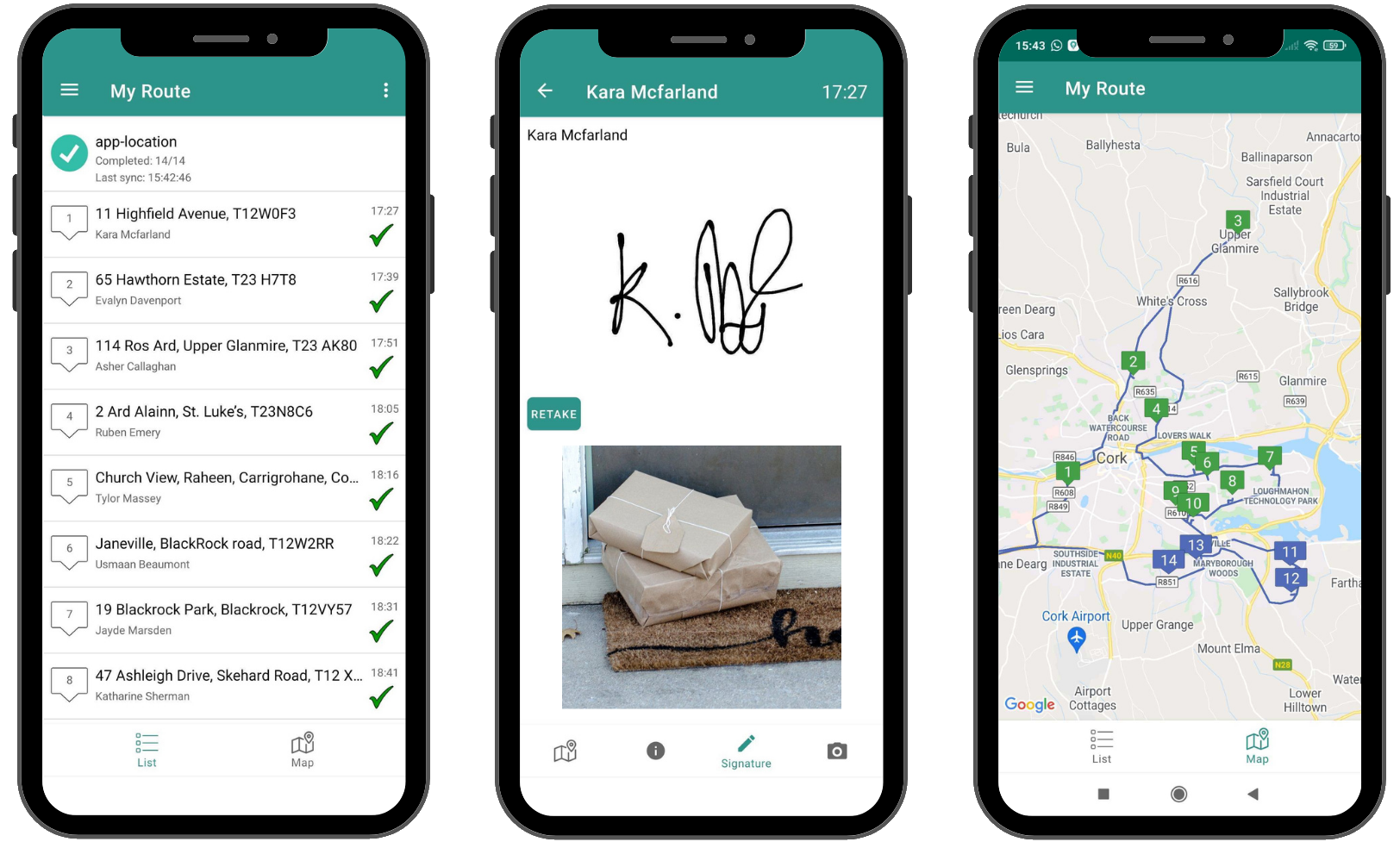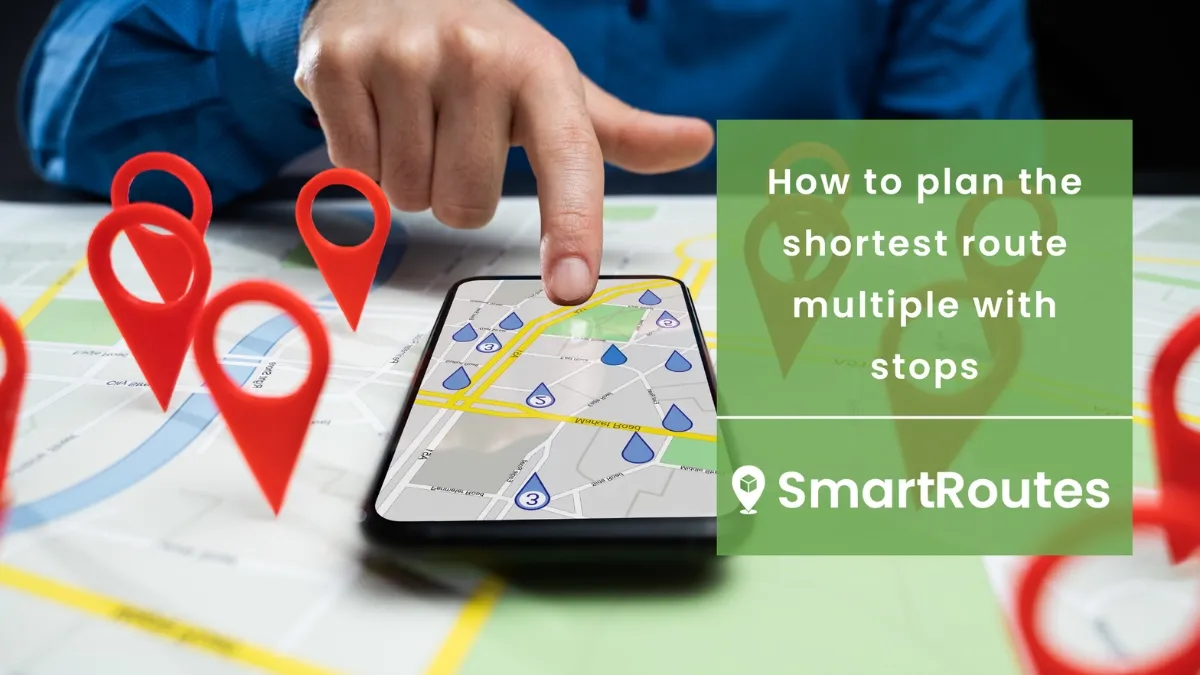The Complete Guide to Multi Stop Route Planning
Multi-stop route planning is incredibly complex and difficult to do well. Luckily for you we have put considerable resources into developing technological solutions that are proven to work.
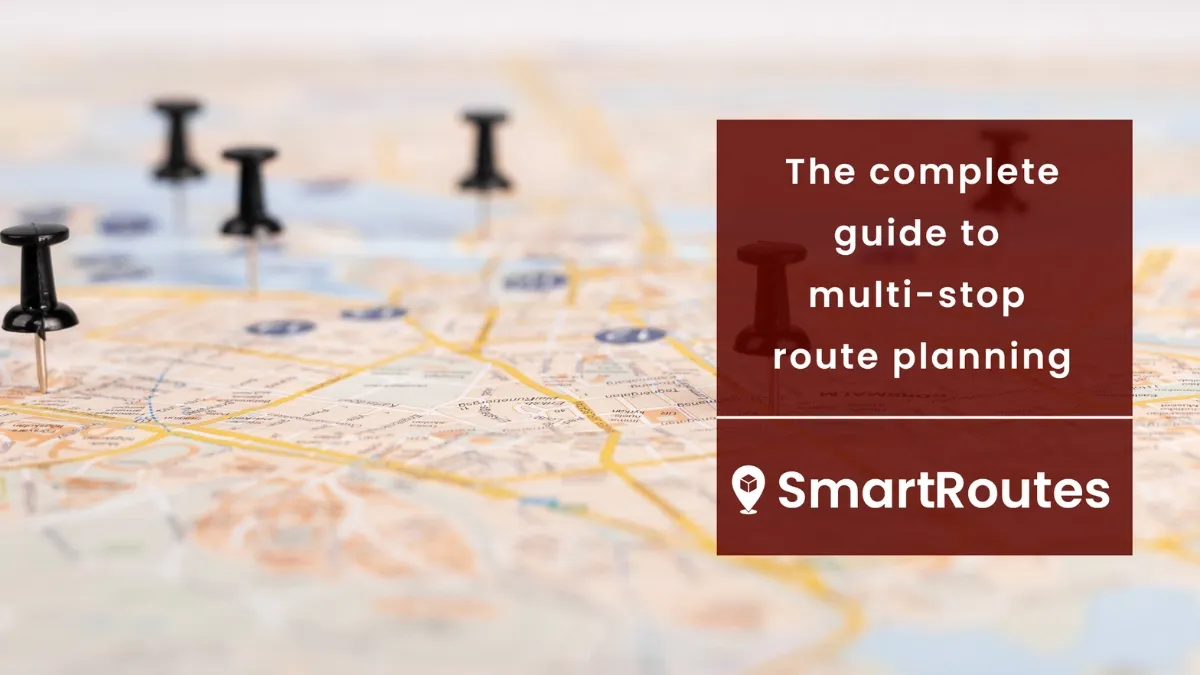
Multi-stop route planning is incredibly complex and difficult to do well. In essence, the idea is to identify the most efficient route between multiple stops. It's not just about picking the shortest distance between stops – that might not be the best way to go. There's a whole bunch of things to consider when you're figuring out the best route for multiple stops. Delivery teams that have efficiently planned their multi stop routes can benefit from things like lower costs, time saved and happier customers!
Here is what you will learn in our complete guide to multi stop route planning:
What is multi-stop route planning?
How to do Multi Stop Route Planning
Why is Multi Stop Route Planning Important?
What Features Must Multi Stop Route Planning Software Have?
Best Multi Stop Route Planners
What is multi-stop route planning?
Multi-stop route planning is a strategic method used to optimize delivery routes by identifying and arranging multiple destinations in the most efficient order. It considers various factors like distance, traffic conditions, time constraints, driver breaks & availability, zones, priority of stops and more. This approach helps businesses save time, reduce fuel consumption, and streamline logistics by determining the most logical sequence of stops to reach multiple locations in the shortest time possible.
SmartRoutes Route Planning Software
Streamline your entire delivery process, all from one platform

How to do Multi Stop Route Planning
It’s important to embrace technology when planning routes with multiple stops. Algorithms consider real-time travel data and can readjust routes if circumstances change. Multi stop routes planners help by accounting for various factors like:
- Distance between stops: Optimizing the order of stops for the shortest overall distance.
- Delivery time windows: Ensuring timely arrivals within specified time frames.
- Vehicle capacity: Maximizing load efficiency for each trip.
- Driver skill and availability: Assigning routes based on individual capabilities and availability.
- Driver hours: Managing schedules to comply with legal driving hour restrictions.
- Load balancing: Distributing loads evenly across routes to prevent overburdening.
Creating territories within delivery areas is a game-changer. It not only increases customer concentration, which minimizes per-stop costs, but also facilitates familiar routes for drivers, enhancing efficiency.
Assigning specific territories to drivers reduces their commute time to the initial stop, significantly cutting down miles driven—often by 10-15%. Additionally, organizing territories by days of the week optimizes delivery schedules. For instance, dedicating one vehicle to a particular area on Mondays and another on Wednesdays ensures fully loaded trips and maintains cost-effectiveness.
Attempting to manually plan these intricate routes can result in costly human errors. Mistakes in multi-stop route planning may lead to missed or repeated deliveries, misplacements of packages, and delays in deliveries. The precision afforded by technology-driven planning significantly mitigates these risks, enhancing overall operational efficiency and customer satisfaction.
Why is Multi Stop Route Planning Important?
Multi-stop route planning stands as more than a mere supplementary task in delivery operations or sales visits; it's intricately interwoven with a business's entire operational framework. Inefficiencies in this area can trigger ripple effects impacting packing teams, factory productivity ('up-time'), and various other facets of the business. For this reason, it is critically important to get your systems connected. Your online ordering system should feed orders directly through to your packing teams and your delivery drivers, facilitated by robust multi-stop route planning software. Similarly, for field sales, integrating CRM systems with multi-stop route planners ensures consistent and efficient customer outreach.
What features must multi-stop route planning software have?
Route Planning & Optimization
Efficient last-mile planning is integral, as inadequate strategies can spike overall logistical costs by a staggering 20-40%. Robust route optimizing algorithms within the software play a pivotal role in reducing the cost per delivery by a substantial 33% when compared to conventional planning methods.
Live Fleet Tracking
The capability to visually track and manage the delivery fleet in real-time through live maps is a hugely important feature. This functionality enables on-the-fly adjustments, allowing managers to adapt routes promptly based on changing conditions or unforeseen circumstances. Such dynamic control not only maximizes efficiency but also ensures a smoother, more adaptable workflow for the entire fleet.
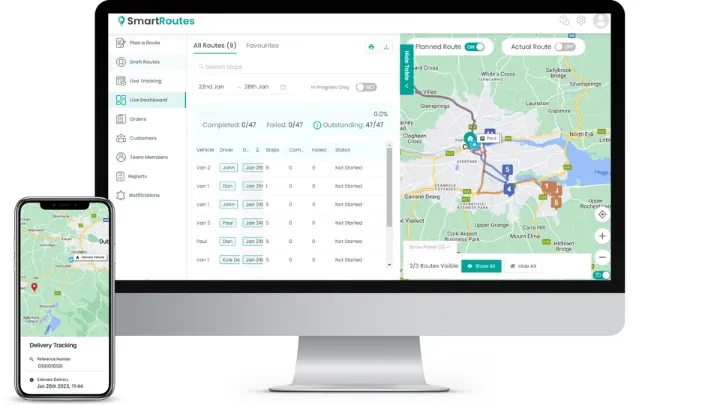
Delivery Driver App
A user-friendly and intuitive app for delivery drivers is paramount in ensuring streamlined operations. This tool simplifies navigation and task management, empowering drivers to efficiently execute their routes. A well-designed app not only enhances their experience but also significantly contributes to the overall efficiency of the delivery process.
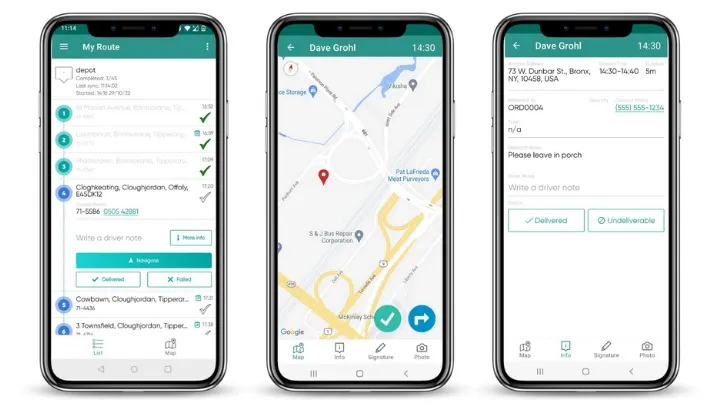
Proof of delivery
Securely capturing proof of delivery through various means like e-signatures, photos, or barcode scans adds a layer of compliance and assurance. Automating email confirmations to customers after successful deliveries ensures security and enhances customer satisfaction.
Delivery notifications
Constant communication with customers during the last mile is a critical aspect of service excellence. Automated delivery notifications, whether through text or email, provide customers with timely updates, reducing uncertainty and minimizing delivery windows. This proactive approach not only increases successful deliveries but also minimizes customer churn, fortifying customer loyalty.
Territory management
Creating delivery zones for intelligent work allocation within these areas streamlines operations. This feature ensures optimized route planning while efficiently managing the workforce within specific territories, contributing to enhanced efficiency and minimized operational complexities.
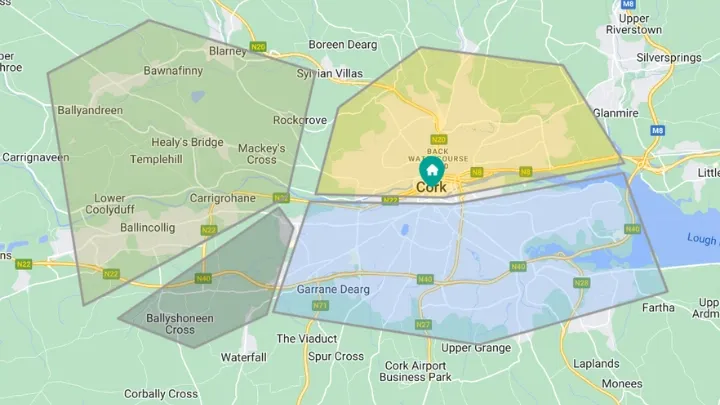
Multi-depot management
This feature allows scaling across diverse locations, creating a network of accounts with tailored administrative roles. This flexibility in assigning roles and permissions ensures efficient management aligned with the operational requirements of each depot.
5 best multi-stop route planners
1. SmartRoutes Delivery Route Planner
Price: Starting from $29 per vehicle per month (Free 7-day trial)
Available on: Mac, PC, iOS, Android
Most Useful for: Big and small fleets
SmartRoutes is the best route planner for home delivery and field sales teams. It is used by over 700 teams worldwide to power multi-stop routes and gives a great experience to drivers and customers. It uses real-time travel data to find the fastest route to your customer addresses, giving drivers directions for multiple stops and dispatch notes to make their life super-easy. It integrates with many CRMs, ERPs and eCommerce platforms to remove unnecessary administrative work for dispatch and drivers.
Features
- Route optimization: routes are automatically planned and optimized based on your criteria. The app also allows for real time modification
- Fleet tracking: for total oversight on drivers
- Order management: integrations with ecommerce platforms such as Shopify and WooCommerce allows for auto fulfillment on orders, streamlining your whole process
- Customer notifications: keep customers in the loop with real time updates and customisable SMS notifications. (You can also add live tracking links to your notifications!)
Verdict
SmartRoutes is the best route planner for delivery teams building intelligence for the company through driver notes and real-time data on actual routes taken.
SmartRoutes reduces miles driven allowing more work to be done by fewer staff and reducing costs for the business.
SmartRoutes starts at $29/month per vehicle and can scale up to Enterprise models with customized development work, dedicated support teams and custom integrations.
2. RouteSavvy
Price: $39 per month per vehicle
Available on: iOS, Android
Most useful for: Small to mid-sized fleets
RouteSavvy is a basic route planner for delivery teams and logistics or courier companies. They cater to a large cross section of business types but are relatively expensive for the feature set.
Features
- RouteSavvy has route optimization and address import as standard.
- They have a visualization of multiple route options that can be useful in deciding which route to take. This is similar to Google Maps.
- On the mobile app you can choose to navigate turn by turn in the app itself.
- Delivery driver tracking via mobile GPS location services is available.
- Reporting can be exported to third-party systems like Microsoft Excel.
Verdict
RouteSavvy should provide a reduction in miles driven and a relatively smooth experience if you are based in the US. Its pricing is similar to other competitors but the user interface is not keeping pace with competitors and needs to be updated.
3. MapQuest
Price: Free
Available on: iOS, Android
Most useful for: Simple routing, business location
MapQuest has been around since 1996 and the interface feels like it hasn’t changed much since then. You have access for free but the ad pop-ups on the mapping functionality itself are very off putting.
Features
- Route planning can be done simply on the map
- You can do voice navigation and it has real-time updates on traffic conditions
Verdict
MapQuest does the job, just about. If you are old-school in your tastes this could appeal and it does do the job of route optimization very well, plus it is free. If, on the other hand, you want a more modern interface and better functionality then your business might be better investing in something a bit better.
4. Speedy Route
Price: $39 per driver per month
Available on: Website
Most useful for: Delivery, delivery time windows
Speedy Route is a super simple routing platform that does the job of multi-stop routing in a clean interface. It has remarkably little beyond routing but sometimes it is good to focus on what you are good at. Pricing is similar to those platforms that offer more features but it is free for less than 10 stops.
Features
- Battle-tested and clean UI to go along with solid route optimization.
- Fully customizable routes with post-optimization re-ordering as necessary.
- Time window allocation for improved delivery success rate.
- Free for up to 10 stops (like Google Maps)
Verdict
This is a slightly outdated interface and the functionality is limited but it does the core job of multi-stop route planning very well and will not cost too much to do it.
5. OptimoRoute
Price: Starts at $39 per driver (Free 30 day trial)
Available on: iOS, Android
Most useful for: Logistics and courier industries or SMBs
OptimoRoute, based in Croatia, is a market leader in routing software and has a functionality suite that is very comprehensive.
Features
- Delivery driver tracking and in-app communication between driver and end customer
- Changeable route depending on last minute changes or adjustments
- Multi-day as well as multi-stop planning
- Driver skills and customer tagging to match the right driver to the right customers, eg drivers with installation credentials automatically being assigned orders requiring installation
- Extensive reporting capabilities
- Planned versus actual routes
- Load balancing capability
Verdict
OptimoRoute is a market leader in improving route times and delivering efficiently. It has raised its prices very significantly recently taking it out of the budget provider bracket.
If you would like to talk to us at SmartRoutes about multi-stop route planning we would be happy to assess your operations and suggest improvements.
Looking for multi-stop route planning software?
If you would like to talk to us about implementing a multi stop route planner for your business, you can avail of a 7-day free trial with SmartRoutes.
Frequently asked questions
1. What is multi-stop route planning?
Multi-stop route planning involves efficiently organizing a series of destinations or stops in a way that minimizes travel time, fuel consumption, and overall effort. It's about creating an optimized sequence of stops to streamline a journey, often used by delivery services, sales professionals, travelers, and logistics companies to maximize efficiency.
2. How do I optimize a multi-stop route for time and efficiency?
To optimize a multi-stop route, consider using route planning software or apps that take into account factors like traffic patterns, distance between stops, real-time updates, and prioritization algorithms. Additionally, grouping nearby stops, considering traffic conditions at different times of the day, and utilizing tools that allow for easy adjustments can significantly improve route efficiency.
3. What are the best apps or platforms for planning multi-stop routes?
Several apps and platforms specialize in multi-stop route planning, offering various features catering to different needs. We have put together a list of the 9 Best Multi Stop Route Planners. These platforms provide functionalities such as multiple stop optimization, live traffic updates, customizations based on vehicle type, and integration with other tools.
4. Can multi-stop route planning help save on fuel costs or reduce environmental impact?
Yes, optimizing routes can help reduce fuel consumption and environmental impact. By minimizing unnecessary mileage and time spent on the road, multi-stop route planning decreases fuel usage and emissions. It also contributes to fewer vehicles on the road, reducing traffic congestion and overall environmental strain.
5. How accurate are the estimated arrival times when using multi-stop route planning tools?
The accuracy of estimated arrival times in multi-stop route planning tools depends on various factors. While they can provide reasonably accurate estimates, unexpected incidents like accidents or road closures might affect the accuracy of these predictions. Generally, the more dynamic the tool and the more real-time data it integrates, the more accurate the estimated arrival times tend to be.
If you enjoyed this blog, you might also be interested in:
